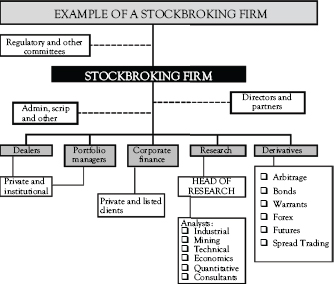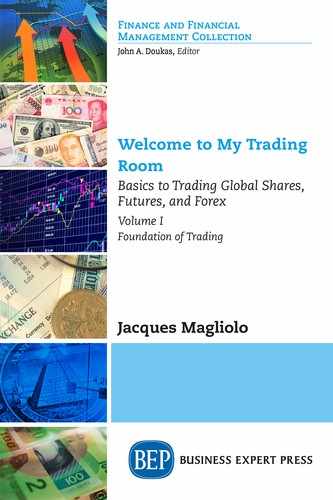Take time to get to know yourself, so that you can better handle your stress level.
A Brief Overview of the Stockbroking Firm

Here is a brief breakdown of the types of people or departments that make up a stockbroking firm. I am about to disappoint many novice traders: There is, actually, no mystery to what a stock exchange is or how it operates.
The mystery and confusion about stockbrokers starts with understanding the differences between the various positions within a stockbroking firm. Often, when an investor calls to open up a trading account, he or she will ask for the stockbroker and not the dealer. Analysts are asked if they trade daily, or whether portfolio managers research duties take them out of town. Corporate financers get confused with researchers and on numerous occasions entrepreneurs will ask for traders when they actually need to speak to corporate advisors to list their companies.
If you want to be a stockbroker, which avenue do you want to pursue?
There are many different career paths and opportunities available through stock exchanges, but the aim of these three volumes are to assist individuals to trade for themselves. Therefore, while it is important to understand what makes up a stock exchange and a broking firm, the main focus is to assist you to set up a trading desk and to provide information on how to buy and sell securities.
Let’s start with a description of how an exchange operates and highlight the different types of investment opportunities available to the public, their benefits and how to invest in these instruments.
There is an invisible “Chinese Wall” between these departments in an attempt to prevent insider trading from taking place. After all, if a corporate financier were to tell a dealer that Company XYZ was about to acquire a competitor, this privileged information could be used to the benefit of a few people, but to the detriment of many.
The subject of these divisions is amply covered in many financial books, so the aim in this chapter is to provide important information to understand the basics of how an exchange operates. You need this basic information to build up a foundation of knowledge before you set up your own trading desk.
Definitions of each of the following terms are provided in the glossary, so the following text concentrates on providing you with a better understanding of how each department interrelates within a stockbroking firm.
The Stockbroker
The stockbroker forms an integral part of the free market system. He or she is the person who administers a mechanism that allows the public to acquire part ownership in companies and therefore have an indirect say in economic development.
Depending on the exchange and country you are trading in, a stockbroker can be known as a registered representative, a broker, or investment advisor. He or she is effectively a professional who executes buy and sell orders for stocks and other securities through a stock market for a stipulated fee, often on a sliding scale.
The stockbroker is thus the person who has obtained the right to be a “share administrator” by passing all relevant stock exchange examinations and all necessary registration requirements. So, when a prospective client telephones an established broker and tells the receptionist that he or she wants to buy shares, it is unlikely that the client’s call will be transferred to the stockbroker. It would be more prevalent for the client to ask for his portfolio manager or for the call to be transferred to a dealer, where the deal would be carried out.
In the case of a one-man operation, the stockbroker will personally do all these tasks, but most brokers have different staff members to carry out such duties.
It must be noted that the term stockbroker today tends to refer to retail brokers. This is a stockbroking firm which deals in securities. The professional who lists companies on the exchange is called a sponsor. This term may be different depending on the exchange being used to list a business. For instance, if you wish to list a business on an SME market in South Africa (The Alternative Exchange), the broker would be called a designated advisor, while listing on the similar market in the UK (The Alternative Investment Market), you would use a nomad.
Other departments within a stockbroking firm include professionals to analyze company trends and forecast future results, maintaining portfolios, trading equities, bonds, and warrants for private or institutional clients.
The Securities Analyst
This is a skilled person who undertakes the task of analyzing markets, trends, sectors, and companies. He or she is responsible for determining current and new market trends and forecasting future company performance, to enable him to forecast a potential share price movement.
The research division usually consists of a head of research, industrial (split into consumer and nonconsumer goods analysts), mining and technical analysts, and an economist. Some broking firms also have political analysts and quantitative and technical analysts.
Industrial analysts look at different sectors of the market and the larger stockbroking firms would have experts to analyze specific sectors, such as consumer-based goods. In turn, mining analysts are divided into their spheres of expertise, such as gold, platinum, or diamonds.
Since the mid-1980s it has become more acceptable for stockbroking firms to hire consultants to do certain tasks. The political analyst usually falls into this category.
The importance of the political analyst includes better understanding of how the potential of serious strike action could affect companies in the near future, whether it will continue or escalate, whether wage demands will rise unabated or whether trade unions will accept alternative to wage increases, for example, share incentive schemes.
In recent years, political analysts have been tasked with assessing the influence of political stability of a country on an exchange and thus on investor sentiment.
Portfolio Managers
Clients’ shares are maintained by the portfolio manager. He or she is responsible for buying and selling shares for specific clients (either private or institutional) and has to keep these clients informed on all trades carried out.
However, many of the larger institutions and brokers have executive meeting to determine what shares should be bought and often clients are placed into stocks or types of stocks that they have no control over. These three volumes set out the mechanics of portfolio management and the techniques that you can use to set up and maintain your own specific criteria for investing.
Interestingly, the required qualifications to be an analyst vary quiet radically around the world. There is an increasing trend to only employ analysts who have graduated with a master’s degree in finance or has obtained the Chartered Financial Analyst (CFA) designation.
In the United States, Wall Street research analysts must also register with the Financial Industry Regulatory Authority, pass the General Securities Representative Exam and also pass the Research Analyst Examination in order to publish research on listed companies.
There are various types of dealers, namely private, institutional and “for own book” dealer. The latter means dealing on behalf of the stockbroking firm you are working for and not for clients. The main task of the dealer is to carry out the function trading shares on behalf of clients.
In essence, he or she carries out buy or sell orders. The difference between the private and institutional dealer is found in the type of client he or she trades shares for. In the former, the dealer trades on request from the public, while the latter deals with institutional clients, such as pension funds.
To become a dealer one starts out as an unauthorized clerk, carrying out messages, answering telephone calls, and other menial tasks. After a period of some months, the clerk is called up in front of a committee to answer questions on trading procedures. If the clerk passes this test he or she becomes an authorized clerk and his or her responsibilities are increased. He or she is thereafter able to conduct trades on behalf of clients.
The Corporate Finance Team
The main function of corporate finance is to carry out any corporate task that involves listed companies and, in many countries today, also private companies. This includes listing or delisting a company, changing a company’s name, issuing new shares, debentures, takeovers, restructuring firms, and so on.
The corporate finance department usually consists of chartered accountants or corporate lawyers, who have also passed the exchange examinations and are, thus also registered members of the exchange.
Administration Departments
All trades are registered daily and the client will either be sent a check for shares sold or an account for shares bought.
This department is important in that it keeps a check on commission received for all trades completed.
Arbitrage is effectively buying and selling of securities at the same time. This is usually a commodities (but can also be currencies) and traded in different markets to take advantage of price discrepancies.
This term actually refers to a process rather than a department. For instance, when an exchange closes down for the night, not all traders close shop for the day. Some stockbrokers have skeleton crews working until midnight, watching the overseas exchanges, and trading in those securities.
This type of trade adds another dimension to making deals, in that the dealer can now take advantage of price discrepancy caused by currency exchange rates. This is the meaning of arbitrage.
Price discrepancies, or arbitrage, are not limited between equities across borders, but can also occur between futures markets.
Derivatives
This “other” market was neglected and ignored by the general public for many years. It seemed too complicated and interest was usually centered in the equities market. However, to achieve a true cross-diversification of a portfolio it is essential in the long term for the investor to consider all available markets.
Analytical Interaction of Departments
Each department has a specific use and, whether or not it provides the stockbroker with a direct income, they do help to complete the investment service offered to clients.
For instance, every morning many stockbroking firms hold a meeting that includes corporate finance, dealers, analysts, directors, and portfolio managers. The meeting is usually chaired by the economist, who outlines the latest market movements; including changes in commodities, interest rates, and currencies.
He or she explains the meaning and possible future consequence of such movements. In addition, he or she discusses any economic statistic released—GDP, consumer price index (CPI), producer price index (PPI), unemployment rates, and so on—and explains possible consequences of the figures.
This is followed by a breakdown of stock market indexes, such as the Overall, Financial, Industrial, and All Gold and Platinum indexes. It is then the analysts turn to discuss company performances (annual reports released in the press). The analyst responsible for a particular company would explain and outline future movements in the company’s performance and how these would affect the share price.
The analyst would conclude by providing a recommendation on whether to buy, sell, or hold the share.
Dealers would outline the previous day’s trade and, thus, market sentiment and new trends are revealed. If corporate finance needs to explain effects of changes in tax laws and so on, they would do this during the meeting.
Armed with the preceding information, dealers and portfolio managers would be able to make better-informed decisions when buying or selling shares for clients. Analysts would be able to streamline forecasts and directors would be able to know what is happening within the firm and in the market.
As a consequence, this volume uses the structure of the stockbroking firm to enable you to set up your own trading desk, with techniques to analyze shares, and methods to build up a portfolio that is sound and one that has long-term upward potential.
Chapter 4 is the start of analysis, outlining different types of shares.
